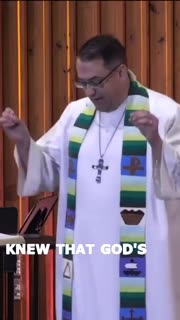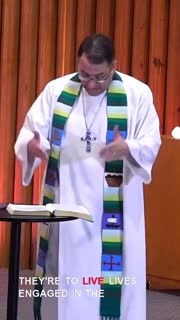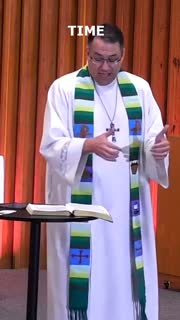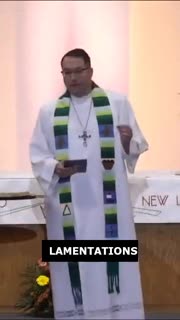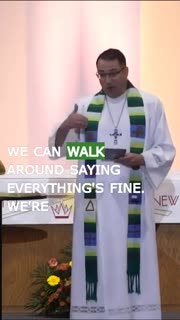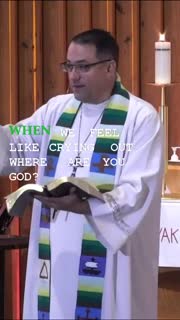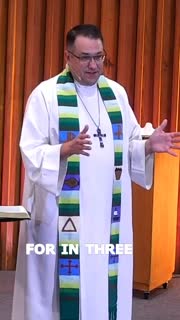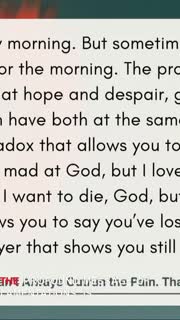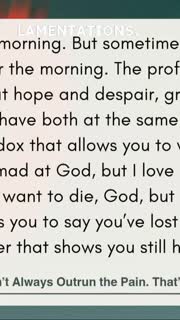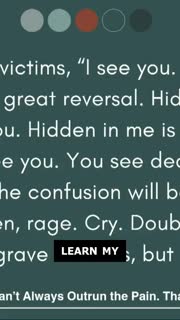Finding Hope Through Lament: Lessons from Lamentations
Devotional
Sermon Summary
Bible Study Guide
Sermon Clips
1. "Jeremiah knew that God's primary nature is to be a God who delivers grace and mercy and forgiveness, so that if the people would repent, God would relent of the disaster that he said he would bring. But the people don't repent, and in 587 B.C., one of the most horrific events in the life of the people of Israel happens, and Jerusalem is destroyed, and they lose everything. They lose their homes. They lose their culture. They lose their place of worship. They lose their leaders. They even lose Jeremiah." [02:50] (32 seconds)
2. "They're to live lives engaged in the midst of the place that they don't want to be. In the midst of a culture that is confusing. In the midst of a world that seems to have been turned upside down. God, through the prophet Jeremiah, tells them to invest in this place. To build houses. To find wives and find husbands. And to pursue the well-being of the city. To pray for the Lord on its behalf. Because when it thrives, you will thrive. When it thrives, you will thrive." [05:02] (29 seconds)
3. "When we spend more time glued to the television and talking heads. Or stuck in the mire of social media and the political rhetoric. With all their agendas. Instead of actually being in the word of God. That we'll spend more time listening to the voices of this world. And so when you spend more time listening to the voices of the world. No wonder why you're scared. Because the world's always scary. But yet God. God has something to say to us in the midst of all of us. And God's agenda is not hidden. God's agenda is clear." [07:22] (28 seconds)
4. "Lamentations teaches us to lament. It allows us to fully face and to name our pain, and it creates a space for a future resolution and a hope without glossing over our trauma with trite sayings like, well, everything's going to be okay. Or everything happens for a reason. But instead gives us permission. It gives us permission to protest life's difficulties. To scream and cry and vent and plead and complain in the presence of God and of other people. It lets us ask some hard questions without condemnation." [17:32] (36 seconds)
5. "We can walk around saying everything's fine. We're doing good. Or to have conversations that are just on the surface and not digging into the things that we're carrying. And the thing that we need to know when it comes to lamenting is we need to know that God is not afraid of your laments. God is not shocked by them. He doesn't shy away from them. And perhaps in our lamenting, He is actually closer than we think. In those times and in those moments that we think that God doesn't understand, God does not know, that God can't relate, we can relent and we can remember what He has experienced in this world." [18:14] (39 seconds)
6. "When we feel like crying out, where are you God? Why is this happening? When we have more questions than we do answers. When the darkness seems so deep. When God seems so distant. When nobody knows. When nobody seems to care. When life has me hanging on by a thread and I have nowhere to turn. There is one who knows. Turn to that Friday of deep darkness. When creation itself was covered in a shroud of confusion that caused even the sun to go dark in the middle of the afternoon." [20:30] (31 seconds)
7. "For in three days that Lord of life burst forth from the grave. Conquering sin. Defeating death. Vanquishing Satan. Not just for Himself. But for you and for me. For all who call upon Him. So in this world when we would have troubles we had one who we can call upon in the midst of those troubles. We don't keep silent. We lament. We cry. We moan. We groan. But at the same time we have hope. Because our lamenting lets us know the story isn't over yet. There's another chapter coming." [22:08] (40 seconds)
8. "The profound message of lamentations. Is that hope and despair. Grief and faith. Can coexist. You can have both at the same time. The book embraces the paradox. That allows you to voice. What might seem contradictory. I am mad at God. But I love him. I doubt God. But I trust him. I want to die. But God help me live. And lamentations. Allows you to say. You have lost your faith in God. In a prayer that shows. You still have it. You still have it." [26:31] (39 seconds)
9. "Lamentations. Doesn't hide the pain. It doesn't neglect or disregard the hurt. But it takes it to the person who can deal with it. In the most surprising of ways. Not with trite answers or pithy sayings. Like it must have happened for a reason. Or it will be okay. Or time heals all wounds. That is not helpful. No I need to go all the way to the cross. The cross of Christ Jesus. Hillman continues in the same article. He says the cross says to victims. I see you. I understand. But hidden in me is a great reversal." [27:34] (40 seconds)
10. "Learn my friends this week. As you read the words of Jeremiah. And as you read the words and lamentations as well. That lamenting is not something that we hide from God. But that we bring to God and one another in the body of Christ. Knowing that that lament. Is a step on the path towards hope and healing. That comes ultimately in the day. We see Christ Jesus face to face. Until that day. Learn to lament well. To the person who can answer that lament each and every time." [28:16] (39 seconds)
Ask a question about this sermon
2. "They're to live lives engaged in the midst of the place that they don't want to be. In the midst of a culture that is confusing. In the midst of a world that seems to have been turned upside down. God, through the prophet Jeremiah, tells them to invest in this place. To build houses. To find wives and find husbands. And to pursue the well-being of the city. To pray for the Lord on its behalf. Because when it thrives, you will thrive. When it thrives, you will thrive." [05:02] (29 seconds)
3. "When we spend more time glued to the television and talking heads. Or stuck in the mire of social media and the political rhetoric. With all their agendas. Instead of actually being in the word of God. That we'll spend more time listening to the voices of this world. And so when you spend more time listening to the voices of the world. No wonder why you're scared. Because the world's always scary. But yet God. God has something to say to us in the midst of all of us. And God's agenda is not hidden. God's agenda is clear." [07:22] (28 seconds)
4. "Lamentations teaches us to lament. It allows us to fully face and to name our pain, and it creates a space for a future resolution and a hope without glossing over our trauma with trite sayings like, well, everything's going to be okay. Or everything happens for a reason. But instead gives us permission. It gives us permission to protest life's difficulties. To scream and cry and vent and plead and complain in the presence of God and of other people. It lets us ask some hard questions without condemnation." [17:32] (36 seconds)
5. "We can walk around saying everything's fine. We're doing good. Or to have conversations that are just on the surface and not digging into the things that we're carrying. And the thing that we need to know when it comes to lamenting is we need to know that God is not afraid of your laments. God is not shocked by them. He doesn't shy away from them. And perhaps in our lamenting, He is actually closer than we think. In those times and in those moments that we think that God doesn't understand, God does not know, that God can't relate, we can relent and we can remember what He has experienced in this world." [18:14] (39 seconds)
6. "When we feel like crying out, where are you God? Why is this happening? When we have more questions than we do answers. When the darkness seems so deep. When God seems so distant. When nobody knows. When nobody seems to care. When life has me hanging on by a thread and I have nowhere to turn. There is one who knows. Turn to that Friday of deep darkness. When creation itself was covered in a shroud of confusion that caused even the sun to go dark in the middle of the afternoon." [20:30] (31 seconds)
7. "For in three days that Lord of life burst forth from the grave. Conquering sin. Defeating death. Vanquishing Satan. Not just for Himself. But for you and for me. For all who call upon Him. So in this world when we would have troubles we had one who we can call upon in the midst of those troubles. We don't keep silent. We lament. We cry. We moan. We groan. But at the same time we have hope. Because our lamenting lets us know the story isn't over yet. There's another chapter coming." [22:08] (40 seconds)
8. "The profound message of lamentations. Is that hope and despair. Grief and faith. Can coexist. You can have both at the same time. The book embraces the paradox. That allows you to voice. What might seem contradictory. I am mad at God. But I love him. I doubt God. But I trust him. I want to die. But God help me live. And lamentations. Allows you to say. You have lost your faith in God. In a prayer that shows. You still have it. You still have it." [26:31] (39 seconds)
9. "Lamentations. Doesn't hide the pain. It doesn't neglect or disregard the hurt. But it takes it to the person who can deal with it. In the most surprising of ways. Not with trite answers or pithy sayings. Like it must have happened for a reason. Or it will be okay. Or time heals all wounds. That is not helpful. No I need to go all the way to the cross. The cross of Christ Jesus. Hillman continues in the same article. He says the cross says to victims. I see you. I understand. But hidden in me is a great reversal." [27:34] (40 seconds)
10. "Learn my friends this week. As you read the words of Jeremiah. And as you read the words and lamentations as well. That lamenting is not something that we hide from God. But that we bring to God and one another in the body of Christ. Knowing that that lament. Is a step on the path towards hope and healing. That comes ultimately in the day. We see Christ Jesus face to face. Until that day. Learn to lament well. To the person who can answer that lament each and every time." [28:16] (39 seconds)
